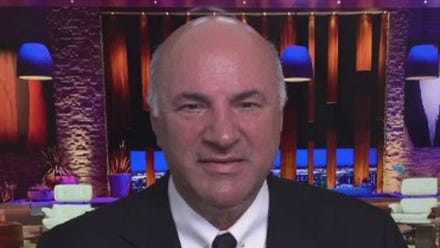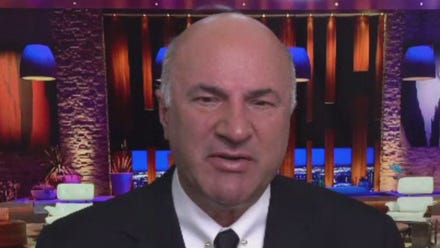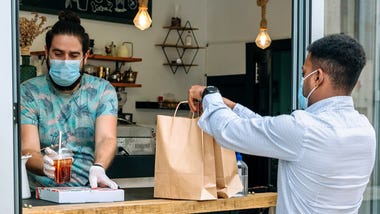
Neil A. Carousso produces NewsNation original “Kurt’s Country” – a celebration of country music and a slice of Americana with host Kurt Bardella.
-
Small Business Spotlight: Pandemic Uncertainty Fuels Suburban Housing Shortage
Post Views: 706By Joe Connolly and Neil A. Carousso
WCBS 880 (NEW YORK) — The housing market has flipped upside down.
As people grow accustomed to new living habits, their housing needs have changed.
Alison Bernstein, founder of The Suburban Jungle Group, owns proprietary software that helps families develop a “home search strategy,” focusing on the neighborhood rather than the housing transaction.
“I think this whole pandemic and the way that we live and the way that we look at life has really shown that thinking about, objectively, all of your options is transforming the way you purchase real estate,” Bernstein said on the WCBS Small Business Spotlight, sponsored by Dime Community Bank.
She started the company in 2004 shortly after having her first child when she was considering moving out of the city to New York’s suburbs to raise her family.
In her home search, she realized there are three bedroom homes everywhere, but only one neighborhood that best suits each family.
“You want to understand, specifically, the community before you get into the home purchase,” said Bernstein.
Her employees are trained to be objective advisors to find the right community fit for each family depending on their lifestyle. For example, The Suburban Jungle Group would recommend a town on Long Island with Little League teams for a family with a young boy who’s interested in baseball. They partner with local agents to make the home purchase.
People are resetting their priorities and Bernstein believes they’re catching onto the flexibility of remote work, which has enabled The Suburban Jungle Group to grow, attract and retain talent, and expand nationally. They recently opened offices in Denver, Philadelphia and South Florida.
“The other piece of it is never having a written out business plan because I always explain to people that your business changes every day and I think where some of these businesses really got stuck when the world changed so quickly (is) they kept going back to this plan,” she said, adding, “You have to be quick and nimble.”
Bernstein told WCBS 880’s Joe Connolly and Neil A. Carousso the housing market is in a bit of a “holding pattern” right now because people are unsure if they will return to the office five days a week, work on a hybrid schedule or stay fully remote as the COVID-19 pandemic extends past a year.
“Right now, all across the board, specifically in the New York market, we’re facing an inventory issue outside of the city and a lot of that has really been driven by sort of the weirdness of the dynamic,” she explained. “This back to work is a big question. There are so many thoughts on what that’s going to look like and nobody really knows and that’s going to be a key determinant in terms of what’s happening in the market.”
The real estate veteran said there’s a lack of housing inventory in the suburbs nationwide, noting people used to live close to where they work, but commuting distance may be outdated for some workers in the post-pandemic economy.
“The home has been completely redefined,” Bernstein said. “Not only is it a place where you sleep, but now, you’re working, you’re schooling, you’re shopping, you’re eating, you’re exercising, so everything about the home is different. And so, now people’s take on home and where they want to be is also very different.”
See the new trends in the real estate market as people’s living habits and needs have changed on the WCBS Small Business Spotlight video above.
-
Mr. Wonderful’s 3 Steps for Growing Your Business Again
In Best Of, Entertainment, Featured, Guest, Interview, Latest, News Stories, Technology, The World, videosPost Views: 825By Joe Connolly and Neil A. Carousso
NEW YORK (WCBS 880) — “Shark Tank” investor Kevin O’Leary stressed business owners need to adapt to what he believes are permanent changes to consumer behavior as a result of the COVID-19 pandemic.
On the WCBS Virtual Business Breakfast, presented by The First National Bank of Long Island, the self-made multi-millionaire entrepreneur made several recommendations of digital tools, sharing actionable advice for business recovery with host Joe Connolly. Mr. Wonderful also revealed what some of his companies have found success doing despite the economic turmoil.
1. MAKE THE “GREAT DIGITAL PIVOT”
.@kevinolearytv says 36/56 companies he had invested in have stayed in business because they embarked on the “great digital pivot.”
— WCBS 880 (@wcbs880) March 29, 2021
See Mr. Wonderful’s steps for growing your business again here: https://t.co/Z6pbg5WJqN#WCBSBizBreakfast #FNBLI @JoeConnollybiz @NeilACarousso pic.twitter.com/Xljxm2tAY0O’Leary divulged that only 36 of the 56 companies he had been invested in across “almost every sector” nationwide are still in business a year into the pandemic.
“They did the great digital pivot and that involves figuring out how to set up a platform – most of them use Shopify not Amazon, number one – to change their websites to be far more interesting and engaging,” he told Connolly.
Shopify allows businesses to create their own e-commerce website using the platform whereas Amazon is the consumer-facing website for companies’ online marketplace.
“They went to 4K photography, 1080p video, they told stories about their products, they had other customers talk about testimonials and how they were using them, so they really engaged people for the first time in ways they’ve never done before because they were forced to – everybody was working remotely,” O’Leary said.
He also shared the trick to monetizing digital content on the WCBS Virtual Business Breakfast. More on that later in Mr. Wonderful’s 3rd step to growing again.
2. PUT YOUR CUSTOMER FIRST
.@ABCSharkTank star @kevinolearytv tells @JoeConnollybiz the best way to sell is to promise customer support and deliver on it. #WCBSBizBreakfast #FNBLI
— WCBS 880 (@wcbs880) April 1, 2021
See Mr. Wonderful’s actionable steps for growing your business here: https://t.co/AtQ2BXZyH3 pic.twitter.com/x4BRNBPcr0O’Leary said the best way to sell is to “promise customer support and deliver on it.”
He told Connolly his frequent advice to young entrepreneurs is that the customer is always number one, and if you treat them like that, you can have a very profitable business.
“The differentiating factor in selling is customer service,” O’Leary said, adding, “You can actually sell the same product for a higher price if you’re in the top quartile of customer service for it.”
The software tycoon invoked Apple as a prime example.
“When you buy a laptop from them, you’re paying 50 percent more than the exact same machine’s function on a Windows-based product or a brand you may not know, but because Apple makes you pay for customer support and you respect it and you want it, you pay a crazy amount more,” he said.
3. REDUCE YOUR CUSTOMER ACQUISITION COSTS
.@NeilACarousso asked @kevinolearytv this question from WCBS 880 listeners. #WCBSBizBreakfast #FNBLI
— WCBS 880 (@wcbs880) April 3, 2021
See more tips for business growth from @ABCSharkTank’s Mr. Wonderful and @JoeConnollybiz here: https://t.co/SAFbziOdnM pic.twitter.com/w4wh9S5tYiWCBS Business Producer Neil A. Carousso posed the number one question WCBS 880 listeners had for O’Leary, which was “How do you monetize digital content?”
Mr. Wonderful responded the only metric for monetizing digital content is whether it can reduce customer acquisition costs for one’s product or service.
“Basically, what you’re trying to do when you make new digital content is to tell a story about your product, show it in its best light, try and get testimonials from other users who are using it and why they use it, and try and acquire customers at the lowest cost you can,” the Shark explained.
“Remember, long-term outcome is basically customer acquisition costs have to be less than lifetime value of the customer acquired. Otherwise, you go out of business,” O’Leary added.
He produces a plethora of content for the companies he’s invested in and shows behind-the-scenes of commercial shoots, media appearances, and his daily life on his YouTube channel, which includes afternoon bike rides along Miami Beach, playing the guitar, cooking in his “Chef Wonderful” videos and enjoying O’Leary Fine Wines with his wife Linda.
A bonus step for growing your business again, O’Leary acknowledges, is a healthy work-life balance.
“I don’t work 9 to 5, obviously, and I try and find life balance in doing the things I love to do while I’m working,” said Mr. Wonderful. “I work seven days a week, but I don’t work every hour.”
-
Small Business Spotlight: What Pandemic-Proof Businesses are Doing to Survive and Thrive
Post Views: 807By Joe Connolly and Neil A. Carousso
NEW YORK (WCBS 880) — Every company has become a tech company.
AlleyWatch Founder and CEO Reza Chowdhury says brand news businesses are currently in better shape than the ones that existed pre-pandemic because they’ve entered the market at lower costs with the COVID-19 pandemic in mind.
“The businesses that have survived have really, in an interesting exercise of elasticity of demand, in many cases have raised their prices because they have less demand and this is a real paradox when it comes to economics,” Chowdhury said on the WCBS Small Business Spotlight, sponsored by Dime Community Bank.
These businesses are trying to cover their losses by raising prices on fewer customers.
“When things open up, new entrants will be able to enter because the demand will rise,” the tech founder explained, adding, “They’ll be able to come in with some sort of advantage.”
Those advantages include lower rents that will allow new businesses to undercut their competitors on price.
Chowdhury told WCBS 880’s Joe Connolly and Neil A. Carousso these new businesses should remain lean and keep their costs low until the future becomes more clear.
AlleyWatch currently has six employees – an amazingly small team for such an influential trade publication that features a daily startup funding report that shows what types of companies and industries are wooing investors. It offers other advertising and content services, too.
While some traditional retailers and professional services firms had resisted building their online presence, they’ve been catching up in the last year. Chowdhury believes they do have transferrable skills that will help them sell online.
“There’s a bit of storytelling involved to get people interested in these products on a digital level,” he said, noting brick-and-mortar stores double as in-person advertising.
The tech guru told WCBS 880 business owners should just try everything in the realm of digital content at first. Businesses should tell their story and share their brand identity to attract target customers. Then, Chowdhury said, utilize a number of research tools available to track engagement and monitor how many people are visiting the point-of-sale website from social media posts.
“You’re going to get, really, an instant feedback mechanism and feedback loop from these tools,” he said, continuing, “The beauty of digital is you can attribute this to where the lead came from.”
From there, Chowdhury says, invest the remaining advertising budget in content that has performed well and can be attributed to sales.
Watch the WCBS Small Business Spotlight video above for tips on implementing a digital strategy and the new trends in business investment.
-
WCBS Virtual Business Breakfast: ‘Shark Tank’ Star Kevin O’Leary Boasts of ‘Digital 2.0 America’ in Growing Out of Pandemic
In Best Of, Entertainment, Featured, Guest, Interview, Latest, News Stories, Technology, The World, Top News, videosPost Views: 828By Joe Connolly and Neil A. Carousso
NEW YORK (WCBS 880) — Kevin O’Leary, the self-made entrepreneur turned TV “Shark,” brought his straight-shooting, no-frills flare to the WCBS Virtual Business Breakfast with Joe Connolly, presented by The First National Bank of Long Island, in sharing how to grow one’s business again.
O’Leary, who was nicknamed “Mr. Wonderful” by co-star Barbara Corcoran in season one of ABC’s hit show “Shark Tank,” praised business owners for their grit and resilience during the unprecedented coronavirus pandemic that has levied a burden on the economy over the past year and shut down major industries, namely restaurants and hospitality companies.
“The great thing about the American entrepreneur is they don’t let failure stop them,” he said. “The majority of them try again and learn from their mistakes.”
O’Leary emphasized a changed economy, telling Connolly owners must pursue a digital “transformation” to survive the pandemic.
“You’ve got to realize that you have to do a digital pivot,” he explained.
Mr. Wonderful said only 36 of the 56 companies he had been invested in are still in business a year into the pandemic, noting many of his still-standing “Shark Tank’ companies shifted to using Shopify for their e-commerce platform and incorporated high-quality photography and video to connect and find new customers.
“They really engaged people for the first time in ways they’ve never done before because they were forced to – everybody was working remotely,” said O’Leary.
“Retail is really challenged because if you’re just (in a) 1,200 square-foot space in a mall and the traffic’s dropped 20 percent, I don’t think that’s going to work out for anybody because consumer preferences have dramatically changed in the last year towards online retail,” he noted.
He suggested direct-to-consumer sales will help businesses to cut and manage costs, grow their gross margins, and build for the future.
O’Leary does not anticipate remote work habits will be broken. He’s actually betting on it to stay by shrinking his real estate portfolio from 31 percent to 8 percent over the next three years while the market adjusts to the post-pandemic economy.
“I haven’t had a cold or been sick since March 7th of last year and I’m starting to like it,” he said, adding, “I don’t think I’m getting in an elevator in New York going up to the 78th floor with 60 people ever again – not in December. I’m not going into a packed restaurant. That may just be me; I’m a germaphobe, but I’ve talked to lots of other people that have the same concerns.”
Kathy Wylde, president and chief executive officer of the Partnership for New York City, cited the “burnout” some employees feel by working from home where many feel they are always at work. She believes employers and employees want to return when it’s safe to do so. Mr. Wonderful disagrees with her assessment.
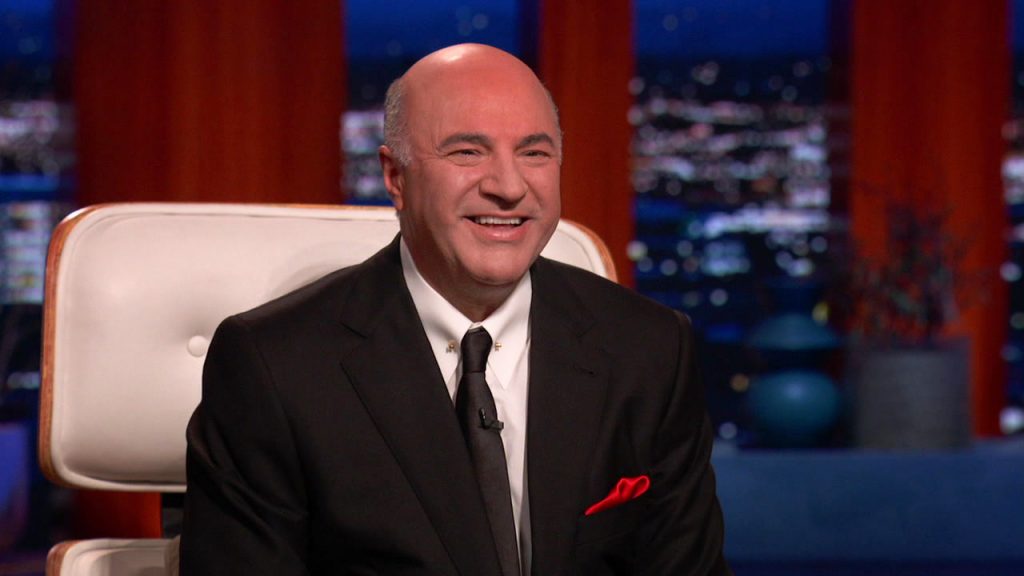
Photo Credit: ABC. “They have no interest in coming back to headquarters – not now, not ever,” O’Leary said of his workers. “In fact, if you try and force them, they’re going to find a job somewhere else where they get that flexibility.”
The O’Leary Financial Group founder told the WCBS Virtual Business Breakfast that he hears most of his 10,000 employees enjoy working from home to take care of children and elderly parents while avoiding rough commutes in major metropolitan cities like New York.
Employers in professional services find productivity is up and they have a widened talent pool across the country and world.
The “Shark Tank” investor said he has made informed business decisions by listening to others he encounters while working remotely, himself, from his Miami Beach dream house where he joined Connolly virtually from his home studio.
One example of this is when he struck up a conversation with the nurse who administered his first dose of the COVID-19 vaccine recently. She explained that at 24 years old she was uncomfortable with the lack of data around the vaccine and fertility.
“I had obviously heard of anti-vaxxers before, but I always thought they were the lunatic fringe – the 10 percent that thought the government was injecting them with a chip or something,” O’Leary said.
“I’m under the impression now, or at least in terms of my investment philosophy, that we’re going to get to a place pretty soon in the next 6 weeks, maybe 8 weeks, where we will have vaccinated two-thirds of the country and we’re going to hit a brick wall. The other third isn’t going to take it,” he believes, thus he’s downsizing his physical footprint, beefing investment in the digital space, and encouraging restaurateurs to re-think their indoor and outdoor dining areas while improving their digital ordering systems for takeout and delivery.
O’Leary sold his first business, renamed The Learning Company from SoftKey Software Products, to Mattel for $4.2 billion in 1999. Now, he owns O’Leary Financial Group, which is a conglomerate of brands that includes investment firm O’Leary Funds. He also serves as chairman of O’Shares ETFs. Kevin, a self-proclaimed wine connoisseur, owns O’Leary Fine Wines. Mr. Wonderful is also heavily invested in financial literacy firm Beanstox, Inc., which is geared towards young people in their 20s and 30s who are more interested in business and investing because of the pandemic.
“Basically, we’ve made it so simple that you try and take 100 dollars a week and put it into the markets through indexing,” he told Connolly of Beanstox. “It’s a tool to help people solve a big problem in America: 100 million Americans do not have anything set aside for their retirement.”
Mr. Wonderful knows how to have fun, too. He shows his lighter side to his 401,000 YouTube subscribers. His hobbies include biking, cooking and playing the guitar.
“I don’t work 9 to 5, obviously, and I try and find life balance in doing the things I love to do while I’m working,” O’Leary said in response to a question from WCBS Business Producer Neil A. Carousso, adding, “I work seven days a week, but I don’t work every hour.”
You can see Kevin O’Leary’s routine, his business philosophy, and actionable advice for growing your business again despite the pandemic on the WCBS Virtual Business Breakfast with Joe Connolly, presented by The First National Bank of Long Island. Watch the full program above.
About Kevin O’Leary:
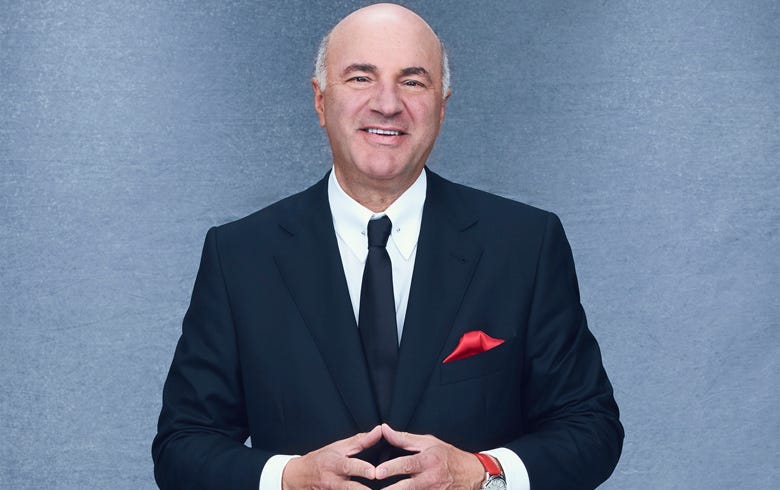
Photo Credit: ABC Kevin O’Leary’s success story starts where most entrepreneurs begin: with a big idea and zero cash.
Kevin O’Leary was born to a middle class family in 1954. The combination of Kevin’s mother’s family heritage as merchants and his father’s Irish charisma truly meant that O’Leary was born for business. Kevin learned most of his business intuition from his mother. She taught him key business and financial insights from an early age. These became Kevin’s core philosophies, and the pillars upon which he would one day build his empire.
Kevin’s approach to business went through major changes as a teenager. During his second day on the job at a local ice cream shop, his boss came into the front of the store where Kevin was scooping ice cream. She looked at Kevin and asked him to scrape all the gum between the Mexican tiles on the floor. Kevin refused and he was fired. That was the moment he realized he never wanted to work for someone else again and charted his path into entrepreneurship as a high school student.
As a university student, Kevin’s innate business sense led him along several different paths – including some very unusual, very entrepreneurial ways of making a profit.
Not long after he finished his MBA, Kevin had a meeting that changed his life forever.
He met a man who had a strange idea for a software product – an idea with huge, high-profit potential that Kevin immediately recognized.After years of ups, downs, sacrifices, challenges, and lessons learned — not to mention a critical phone call that nearly cost him everything — the opportunity that Kevin saw eventually turned into a computer software giant that was acquired for more than $4 billion dollars.
After his extraordinary success at the software company, he founded – and a difficult period of obstacles and legal disputes – Kevin eventually found himself on television, quickly becoming a sought-after host and personality on a range of shows – including Discovery’s Project Earth, CBC’s Dragons’ Den, and ABC’s Shark Tank.
Kevin has since launched O’Leary Funds, an investment fund company; O’Leary Fine Wines; and a best-selling book series on financial literacy.
In 2014, Kevin founded O’Leary Financial Group – a group of brands and services that share Kevin’s guiding principles of honesty, directness, convenience, and above all, great value.
-
Small Business Spotlight: Software Tailored for Restaurants Hones New COVID Sales Strategy
Post Views: 848By Joe Connolly and Neil A. Carousso
NEW YORK (WCBS 880) — Restaurants are trying to get control over their destiny.
SevenRooms, co-founded in 2008 by Joel Montaniel, created backend software for restaurants and hospitality companies to streamline ordering and reservations. Now, they are more of a data-driven technology company helping restaurateurs gain repeat customers in a precarious time for eating out.
“The most significant change that restaurant operators need is to have their own platform where consumers can order delivery directly from them,” Montaniel told Joe Connolly and Neil A. Carousso on the WCBS Small Business Spotlight, sponsored by Dime Community Bank.
He emphasized that control over takeout and delivery – the most common pandemic pivot in the food industry – will increase profit margins by saving commission many owe to third-party delivery apps such as Grubhub, Postmates, DoorDash and Uber Eats.
The second key for restaurants to recover, Montaniel believes, is capturing customer data internally, which SevenRooms’ software does, to upsell those who have placed orders. The technology company recently introduced digital menus to establishments that tracks order history.
“If you had opted into their marketing database, the SevenRooms system will automatically email you again, and say, ‘Hey Neil, here’s a complimentary tzatziki when you order delivery or pickup directly from us,’” he hypothesized using Carousso as a customer in his example. “So, it’s a great way to leverage what you’re actually doing inside the restaurant and use it as a benefit for you to order pickup and delivery or come back into the restaurant when you feel comfortable doing so.”
Montaniel told WCBS 880 that 64 percent of SevenRooms users prefer ordering directly from an establishment rather than third-party apps. He said many are eager to support their local eateries since the industry was largely shutdown due COVID-19 and remains open with strict safety restrictions.
That loyal customer base is essential to restaurants’ recovery. The SevenRooms co-founder and CEO labeled Domino’s Pizza the “gold standard” because they own their own application for contactless ordering, pickup and delivery.
SevenRooms counts Wimbledon, Live Nation Entertainment and Topgolf among its hospitality clients.
“They’re thinking about the world the same way, which is how do we create the best, most optimal, and now recently, safest guest experience and I think technology can play a role in that to make everyone feel safe,” Montaniel said of how they are looking to reinvent themselves as local venues reopen to fans for the first time in about a year.
See how SevenRooms is helping this hard hit sector survive on the video above.



